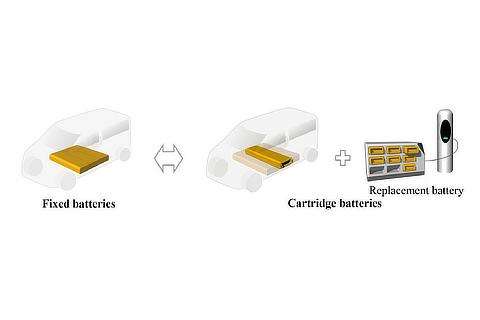Are replaceable cartridge batteries the answer?
27 July 2022
Yamato, Commercial Japan Partnership to study replaceable, rechargable batteries
Yamato Transport Co. Ltd. and Commercial Japan Partnership Technologies Corp. (CJPT) said they will begin studying the standardization and commercialization of replaceable and rechargeable cartridge batteries as part of energy management efforts for achieving a carbon neutral society.
The introduction of commercial battery electric vehicles (BEVs) poses several challenges, including recharging times that are longer than refueling times for conventional gasoline and diesel vehicles, as well as increased logistics downtime (when vehicles and cargo are at a standstill) due to numerous vehicles recharging at or around the same time. The introduction of commercial BEVs is also expected to impose an increasing burden on society as a whole, such as by increasing peak electricity demand at business sites due to concentrated recharging by numerous non-operating vehicles.
To solve these issues, Yamato Transport, one of the largest logistics service companies in Japan, and CJPT will begin studying the practical application of detachable and portable cartridge batteries based on their following merits.
 Commercial Japan Partnership Technologies Corp. believes replaceable and rechargeable cartridge batteries can solve many challenges for commercial battery electric vehicles. (Illustration: Toyota Motor Corp.)
Commercial Japan Partnership Technologies Corp. believes replaceable and rechargeable cartridge batteries can solve many challenges for commercial battery electric vehicles. (Illustration: Toyota Motor Corp.)
- Able to reduce the cost of BEV introduction: The cost can be reduced by limiting battery capacity ― and, thus, the total amount of batteries ― to match driving-range needs.
- Able to reduce the recharging burden: The burden related to the installation of recharging infrastructure can be reduced.
- Able to reduce logistics downtime: Battery replacement can reduce vehicle recharging time.
- Able to level electricity demand: Replacement batteries can be recharged while vehicles are in operation, reducing peak electricity demand.
Furthermore, CJPT said it intends to advance plans for commercial BEVs that cartridge batteries can power. The company said it believes commonizing cartridge batteries and recharging systems for vehicles ranging from BEV mini-commercial vans to BEV light-duty trucks will reduce the cost of commercial BEVs and encourage their widespread use. As an energy-management solution, the company seeks to propose ways to achieve battery use that matches actual use requirements.
Meanwhile, Yamato Transport said it will build a green delivery eco-system that includes its transport and delivery partners by co-creating with communities a cartridge battery-based electricity utilization scheme. In addition to promoting the use of green power by eliminating the gap between renewable energy generation peaks and the timing of recharging commercial BEVs, the company also intends to study ways to increase the resilience of electric energy supply communities, such as by delivering cartridge batteries in times of disaster to areas where it is difficult to maintain electric power infrastructure.
The two companies are reportedly open to considering collaboration with new partners for the standardization and commercialization of cartridge batteries toward popularizing electrified vehicles as a way to contribute to the achievement of a carbon-neutral society.
CJPT was launched in early 2021 to accelerate societal implementation and dissemination of CASE (which refers to connected cars, autonomous driving, shared, and electric technologies) and services. It combined the commercial business foundations cultivated by Isuzu Motors Ltd. and Hino Motors Ltd. with the CASE technologies of Toyota Motor Corp. Suzuki Motor Corp. and Daihatsu Motor Co. Ltd. have also joined the partnership, which is 60% owned by Toyota.
STAY CONNECTED




Receive the information you need when you need it through our world-leading magazines, newsletters and daily briefings.
POWER SOURCING GUIDE
The trusted reference and buyer’s guide for 83 years
The original “desktop search engine,” guiding nearly 10,000 users in more than 90 countries it is the primary reference for specifications and details on all the components that go into engine systems.
Visit Now
CONNECT WITH THE TEAM










